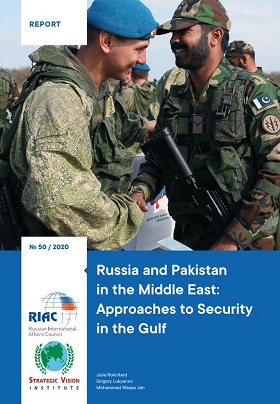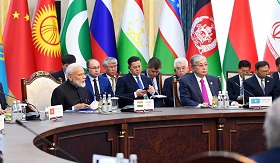Last year in June, during the Shanghai Cooperation Organization (SCO) Summit held in Kyrgyz, capital of Bishkek, the founder member Russian Federation assumed the next SCO presidency. A decision was reached to organize the highest apex forum of the Heads of States Council meeting of SCO Member states in Chelyabinsk on July 22-23, 2020. During this period of presidency, the Russian Federation chalked out important initiatives meant to contribute to the regional and multilateral strength within the framework of the organization. After Russia took over the SCO presidency, the Advisor to the Russian President met with the Secretary-General of the SCO to finalize a yearlong action plan for Russia's presidency in order to implement the strategy meritoriously.
Since its establishment, the SCO has evolved from a narrowly defined security framework to today's organization that is diversifying its objectives in all the sectors and levels of the society in order to create growth and development. Today, the SCO has transformed into a forward-looking and progressive regional organization wherein the framework is achieving institutional building, confidence building through public and preventive diplomacy. Throughout this transformation process, Russia has made meaningful contributions. In order to further enhance Russia's role in the grouping, it also has the possibility to take the lead by increasing investments in the socio-economic development sector, by implementing the key regional economic projects, and by building a broader understanding amongst observers and dialogue partners. Finally, people will remember that Russia took the lead while trying to help humanity in the fight against the current pandemic through the SCO forum.
Last year in June, during the Shanghai Cooperation Organization (SCO) Summit held in Kyrgyz, capital of Bishkek, the founder member Russian Federation assumed the next SCO presidency. A decision was reached to organize the highest apex forum of the Heads of States Council meeting of SCO Member states in Chelyabinsk on July 22-23, 2020. During this period of presidency, the Russian Federation chalked out important initiatives meant to contribute to the regional and multilateral strength within the framework of the organization. After Russia took over the SCO presidency, the Advisor to the Russian President met with the Secretary-General of the SCO to finalize a yearlong action plan for Russia’s presidency in order to implement the strategy meritoriously. Through the strength and enacted compact framework with a solid system of consolidated mechanisms put forward for the inclusive development and cooperation amongst states, the SCO has outshined many other regional groupings. Established as SCO in 2001, as the successor of the Shanghai Five, the organization will celebrate its 20th anniversary next year. The forum has eight permanent member states including China, Russia, Pakistan, India, Tajikistan, Uzbekistan, Kazakhstan, Kyrgyzstan while Belarus, Iran, Magnolia, and Afghanistan are “observer states”. There are six countries which are dialogue partner countries, including Armenia, Sri Lanka, Azerbaijan, Cambodia, Nepal, Turkey. This year, Russia will be in the limelight as the country will host major international events, including the SCO Summit, the BRICS Summit, the Cancer Control Summit 2020 and the SCO Business Council meeting. During this period of presidency, Russia will also invite all SCO member states to be part of the grand celebrations of the 75th anniversary of the victory in the Second World War. The ongoing challenging period due to the COVID-19 pandemic is slashing the world’s social, economic and political fabrics. Thus, the SCO forum, under the ongoing presidency of the Russian Federation, is offering a favourable time to build a collective and effective humanitarian response mechanism to face this challenge together.
A comprehensive year-long action plan has been devised by the Russian Federation to effectively implement the aims and objectives outlined in the framework during the presidency. There are more than 90 different items that are blended together for the collaboration in the sectors of security, trade, economic, cultural and humanitarian affairs. During this presidential period within the SCO, the Russian Federation will provide support in consolidating the efforts of the SCO and its member states hence promote integration processes in the regional framework as well. Russia has also chalked out plans to provide an effective platform like that of inter-parliamentary track for the SCO to host the meetings of the heads of the legislative structures from the member states. This will improve the sharing of the outcomes and processes of the state structures with each other to enhance the understanding of the state bodies and government mechanisms. Russia has further marked the plan to improve cooperation among member states, especially on counter-terrorism measures, extremism and drug trafficking. There is also a plan to enhance the functionality of the SCO Regional Anti-Terrorist Structure (RATS). Another important objective in the plan is to improve and expand the economic cooperation base amongst the SCO states. Over the years, the trade between the SCO countries has remained far less than it should have been after the advent of the Belt and Road Initiative and Eurasian Economic Union, which are supporting and providing effective linkages. Russia, throughout its period of leadership in the SCO, is focusing on the improvements in science and technological cooperation, innovation, and transport. The Russian leadership is also looking to create an equal, inclusive and open Eurasian space. Another important step that has been devised during this period is the launch of inter-regional assistance mechanisms to organize the first Forum of Heads of Regions from the SCO member states in Russia.
Apart from improvements and a substantial ongoing inter-regional collaboration, Russia is also planning to facilitate cooperation among the small and medium-size enterprises to favour economic transformation within the SCO. Russia is also putting all its efforts so that during this time of the year, the role of the SCO can be promoted based on the soul of the organization as Shanghai spirit of openness, mutual respect, equality, good neighbourliness and respect for each other's interests. During this time, Russia will also draw further attention on the creation of substantial headways in building partnerships amongst the member states to promote education, environmental protection, culture, tourism and youth contacts as well. This will be at the level of the communities where people to people ties have been developing amongst countries in order to enhance better understanding amongst civilizations. As a responsible permanent member of the United Nations (UN) Security Council, the Russian Federation also willing to promote the collaboration of the SCO with the UN and its various important agencies as well. In addition, Russia has also planned to build the SCO's collaboration with other regional organizations like ASEAN, CSTO, CIS and ECO. Several important initiatives and projects have been designed to build a partnership with the other organizations as well.
Over the years, Russia has maintained a subtle balance within the SCO, especially through cordial relations with all the member countries including the Central Asian Republics, China and recently added Pakistan and India. Recently, under the leadership of President Vladimir Putin, Russia has played an active role in the regional and international affairs, by rebuilding its great power status. The SCO is an excellent forum, where Russian interests are diversifying and converging with all other member states. The organization is also providing an effective forum for the Russian Federation to create conditions that are conducive for the Federation to consolidate its foreign policy objectives in its near east and especially what historians have labelled "backyard". Having half of the world's population, four nuclear powers, covering 27 per cent of the world's GDP, the SCO represents an opportunity for Russia to build its power base. Due to the increasing focus of the SCO on peace and security issues, Russia has predominantly continued to pursue its security interests in the grouping. Even academic scholarships, reports, and opinion articles have focused on this aspect of the Russian Federation. This time around, when Russia has assumed the presidency, we have also observed that it has outlined its focus on economic and trade relations along with building relationships between people, working on collaboration amongst civilizations, as well as in education, science and technology. This primarily reflects the idea that Russia is viewing the SCO as a mechanism to engage with China, Central Asian States, India and Pakistan on productive political, strategic, economic and humanitarian levels.
Since its establishment, the SCO has evolved from a narrowly defined security framework to today’s organization that is diversifying its objectives in all the sectors and levels of the society in order to create growth and development. Today, the SCO has transformed into a forward-looking and progressive regional organization wherein the framework is achieving institutional building, confidence building through public and preventive diplomacy. Throughout this transformation process, Russia has made meaningful contributions. In order to further enhance Russia’s role in the grouping, it also has the possibility to take the lead by increasing investments in the socio-economic development sector, by implementing the key regional economic projects, and by building a broader understanding amongst observers and dialogue partners. Finally, people will remember that Russia took the lead while trying to help humanity in the fight against the current pandemic through the SCO forum.






